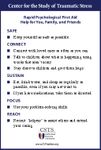War in Ukraine Mental Health Resources
Exposure to war causes a wide range of harmful mental health effects. Those working with refugees and people directly impacted in Ukraine can protect mental health by using the following evidence-based actions and other resources below:
УКРАЇНСЬКА Po polsku русский 日本語 Français
- Ensure physical safety and the safety of treasured belongings people may bring (e.g., locked trunks).
- Connect people to loved ones whenever possible to enhance support.
- Use culturally sensitive calming techniques to help lower stress.
- Be alert to usual illnesses present in populations – from diabetes to hypertension to schizophrenia – and ensure care is provided.
- Remain aware and sensitive to trauma history as this may exacerbate negative response or distress.
- Be present for children and provide explanations to their questions, but do not overload them with frightening information.
- Helping people with problem-solving is a form of caring that reminds them of their own strengths and abilities.
- Recruit "helpers" to assist others and have them extend your ability to deliver care.
No permission is needed to use or adapt the public domain content below from the Center for the Study of Traumatic Stress. You may use it freely as it is helpful to you
Pocket Cards
|
Rapid Psychological First Aid: |
Click HERE for all versions of Rapid Psychological First Aid: Help for You, Family, and Friends
Click HERE for all versions of Helping Others Calm an Acute Stress Response
Additional fact sheets are below to help children and families, healthcare and humanitarian aid workers, as well as community and military leaders:
Children and Families
Helping Children Understand Frightening Events
Managing the Stress of Children after a Crisis
Helping Children Cope During Deployment
Teachers Helping Students during War and other Disasters
Advancing the Health of Military Families During Deployment
Post Disaster Stress Management for Parents
Managing the Stress of War and Disaster
Reconnecting with Your Spouse or Partner after Military Deployment
Understanding Combat Stress to Help Your Loved One
How to Get a Service Member to Seek Help after Combat
Caring for Your Family after a Service Member's Traumatic Brain Injury
Military, Healthcare, and Aid Workers
Sustaining the Well-Being of Caregivers While Helping Victims of War
Optimizing Sleep in an Operational Environment: A Guide for Service Members
Information for Responders on Emotional Reactions to Human Remains
How Healthcare Providers Can Help Service Members Seek Care
Notifying Family Members after Unexpected Deaths: Guidance for Healthcare Providers
Caring for Combat Injured Families: Principles for Healthcare Professionals
How Healthcare Providers Can Help Families after a Service Member's Traumatic Brain Injury
Behavioral Health Concerns Providers Should Know About During Nuclear Events
Community and Military Leaders
Guidelines for Leaders on Notifying Family of Dead or Missing Loved Ones
Grief Leadership to Promote Sustainment and Recovery During War
Military Leadership During Stressful Situations
Leadership Communication for Anticipating and Responding to Stressful Events
Educational Training Videos
Finding Structure in Chaos: Caring for Patients in War and Other Disasters
У пошуках структури у хаосі: турбота про пацієнтів в часи війни та інших катастроф
Fostering Resilience After Combat: Return to Military Duty or Reintegration into Civilian Life
Psychological first aid to military
Leadership behaviors in war and disasters
Additional Resources
iCover
with Ukrainian subtitles
Stop the Bleed
Links
Displacement and Resettlement: Resources from Sesame Workshop to Help Children
PFA MOBILE: Android Version - in Ukranian (NCTSN)
Sustaining Mental Readiness in the Context of Prolonged Stress (WRAIR)
Sleep in High Stress Environments (WRAIR)
Coping with Traumatic Events (Tuesday's Children)
Resources to Support Ukrainian Military Children & Their Families (MCEC)
Talking to Children about War (NCTSN)
Age-Related Reactions to a Traumatic Event (NCTSN)
Psychological First Aid for Displaced Children and Families (NCTSN)
Traumatic Separation and Refugee and Immigrant Children: Tips for Current Caregiver (NCTSN)
Understanding Refugee Trauma: For Mental Health Professionals (NCTSN)
Understanding Refugee Trauma: For Mental Health Professionals For Primary Care Providers (NCTSN)








